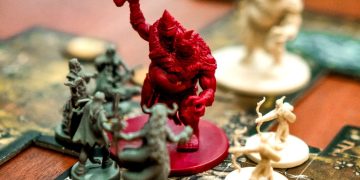When it comes to the masters of the arcane, no one can truly touch the Wizard in Dungeons & Dragons 5th Edition.
Every edition of D&D has offered its own take on these spellcasters, each emphasizing the unbridled power that Wizards have at their disposal.
No other class has such a large list of potential spells, and it's normal for new players to feel somewhat overwhelmed as they try to navigate their options and build their Wizard as well as they can.
Some things are obvious—like making Intelligence your highest stat—but not everything is. Here's what you need to know to get the most out of the Wizard in D&D 5e and be useful to your party.
This article is part of a series of D&D class guides for beginners. If you're interested in other classes, check them out as well:
- D&D 5e Barbarian Guide for Beginners
- D&D 5e Bard Guide for Beginners
- D&D 5e Cleric Guide for Beginners
- D&D 5e Druid Guide for Beginners
- D&D 5e Fighter Guide for Beginners
- D&D 5e Monk Guide for Beginners
- D&D 5e Paladin Guide for Beginners
- D&D 5e Ranger Guide for Beginners
- D&D 5e Rogue Guide for Beginners
- D&D 5e Sorcerer Guide for Beginners
- D&D 5e Warlock Guide for Beginners
- D&D 5e Wizard Guide for Beginners
Tip 1: Knowledge Is (Literally) Power
While Sorcerers derive magic from their bloodlines and Warlocks get their arcane power by making pacts with otherworldly beings, Wizards gain power through careful study of the natural fabric of the world.
As a Wizard, you'll be maintaining a spellbook that contains the fruits of your study: the more spells you learn and collect, the more powerful you'll be—because those are the only spells at your disposal.
There are many ways to gain new spells as a Wizard. The easiest method is to gain a level, at which point you get to add a new spell to your spellbook, chosen from a list of standard options.
You might also come across books and scrolls on your adventures, which could be found in libraries, dropped by monsters, or acquired as part of a heist. You might even tear pages from the spellbooks of other Wizards.
Those spells can be transcribed into your own Wizard's spellbook, provided you have the time and gold necessary to do so. Wizards are defined by their thirst for knowledge, so don't pass up such opportunities to expand your repertoire of spells!
Tip 2: Embrace Your Flexibility
Not only are Wizards the only class capable of gaining access to new spells between levels, but they can also alter their Prepared Spells every morning. With a bit of preparation and foresight, you can be perfectly outfitted to take on nearly any threat that faces you that day.
However, to make the most of this class capability, you—the player behind your Wizard character—must be comfortable asking questions of the DM about the NPCs they'll be involving in your adventures.
Of course, you'll want to employ in-character methods to learn such information rather than explicitly asking for it out-of-character and metagaming with it. That said, it's up to you to play your Wizard in a way that seeks out that information within the campaign.
If you learn that a certain monster is vulnerable to an element you don't have access to, it'd behoove your Wizard to research a spell that might come in handy—and then load it as a Prepared Spell at the right time.
Note: Spells like Comprehend Languages can come in handy for this, since many arcane sources may not be available in Common Tongue. If you can learn languages permanently, all the better!
Tip 3: Use Arcane Recovery Every Day
Beyond your limited number of Hit Points, the biggest drawback you'll face as a Wizard is a lack of useful options when you've expended all of your Spell Slots and have nothing else you can do.
Sure, you get to refresh your Spell Slots every day, and you have some compensation in the fact that you gain new Spell Levels faster than most caster classes. Still, you're unlikely to wade into direct combat like a Cleric could when their spells run dry.
This is where Arcane Recovery comes into play.
Arcane Recovery is a class feature that can be used once per day. When you take a Short Rest, Arcane Recovery lets you reclaim some of your expended Spell Slots so you aren't completely useless.
When choosing which Spell Slots to reclaim, the total combined level of the chosen Spell Slots can't exceed half your Wizard Level (rounded up).
For example, if you're a 5th Level Wizard, Arcane Recovery would allow you to reclaim three 1st Level Spell Slots or maybe a single 3rd Level Spell Slot. It's up to you according to your needs in your circumstances.
The important thing is to make sure you use Arcane Recovery every single day because there's no point in saving it from day to day. Those reclaimed Spell Slots could make a huge difference!
Tip 4: Understanding Arcane Traditions
At 2nd Level, Wizards get to choose an Arcane Tradition, which gives you a greater grounding in a particular school of magic.
Not only does your choice of Arcane Tradition make it faster and cheaper to transcribe new spells into your spellbook, but it also grants powerful abilities tied to your chosen school of magic.
With Wizards being more flexible than pretty much every other class, it's fitting that they have more possible Arcane Traditions than other classes have for their respective class paths.
The sheer number can be overwhelming, though, so here's a brief summary of each one. Ask yourself what you think your Wizard is best at, then try to match with a relevant option:
- School of Abjuration: If you want your Wizard to specialize in the casting of protection spells and wards.
- School of Conjuration: If you want your Wizard to specialize in creating objects out of thin air and summoning creatures.
- School of Divination: If you want your Wizard to specialize in foresight and the ability to twist fate (for yourself and for others).
- School of Enchantment: If you want your Wizard to specialize in bending the minds of others to your will.
- School of Evocation: If you want your Wizard to specialize in throwing around powerful elemental spells like Fireball.
- School of Illusion: If you want your Wizard to specialize in making others question their senses and lose their grasp on reality.
- School of Necromancy: If you want your Wizard to specialize in raising the undead and controlling them as servants.
- School of Transmutation: If you want your Wizard to specialize in altering the physical world and shifting both matter and energy.
The important thing to remember about your Arcane Tradition is that it does NOT limit which spells you can learn.
For example, a School of Transmutation Wizard can still learn and cast spells like Fireball or Charm Person without issue, but they'll be more adept at using transmutation spells like Polymorph.




